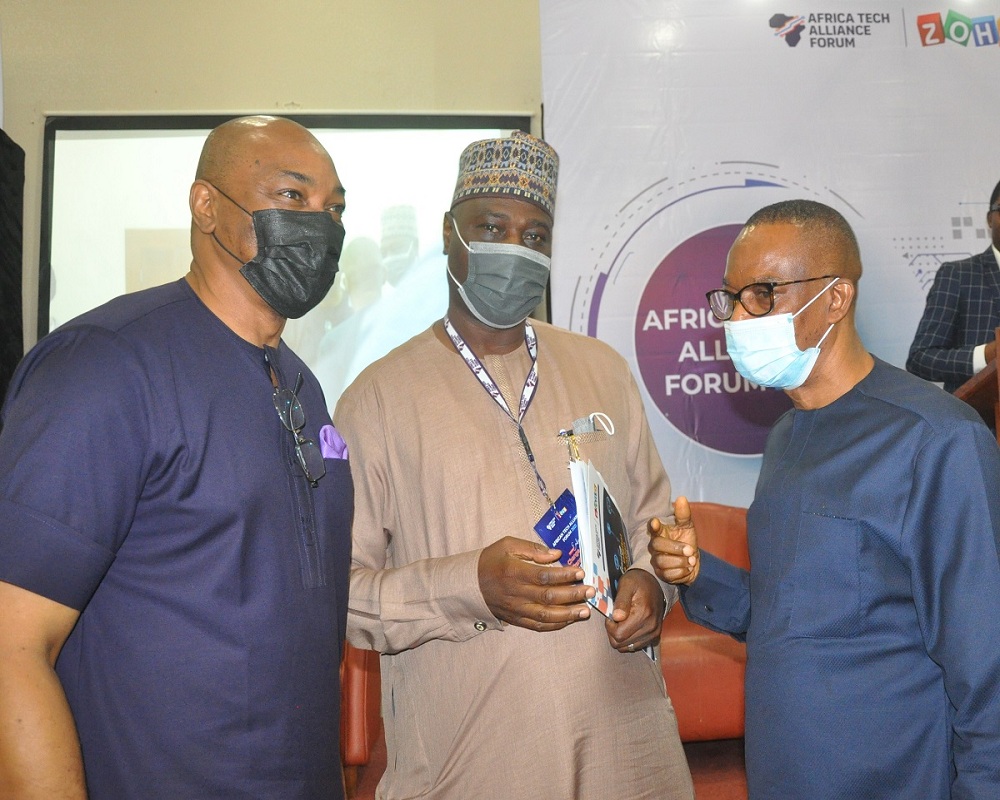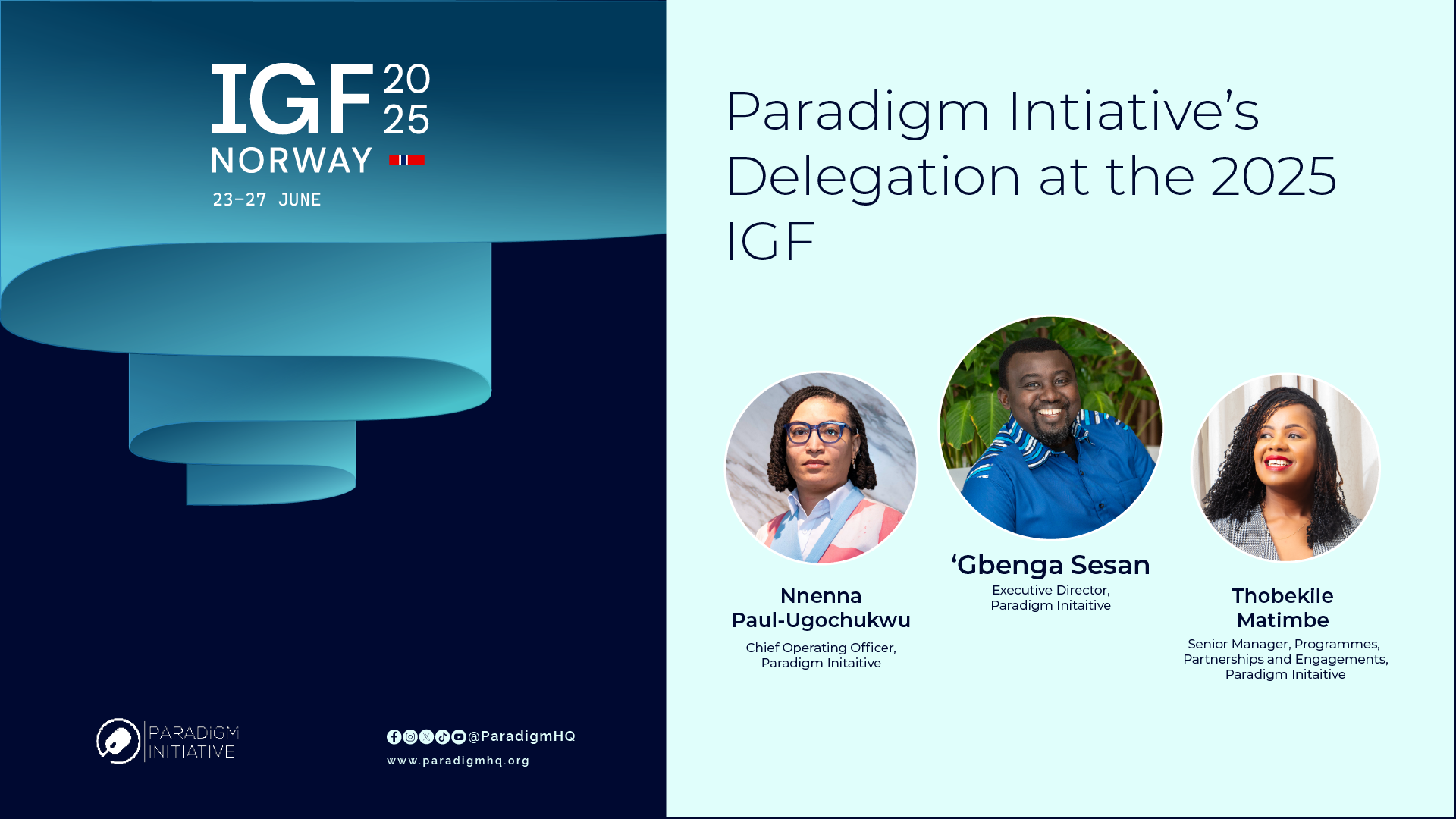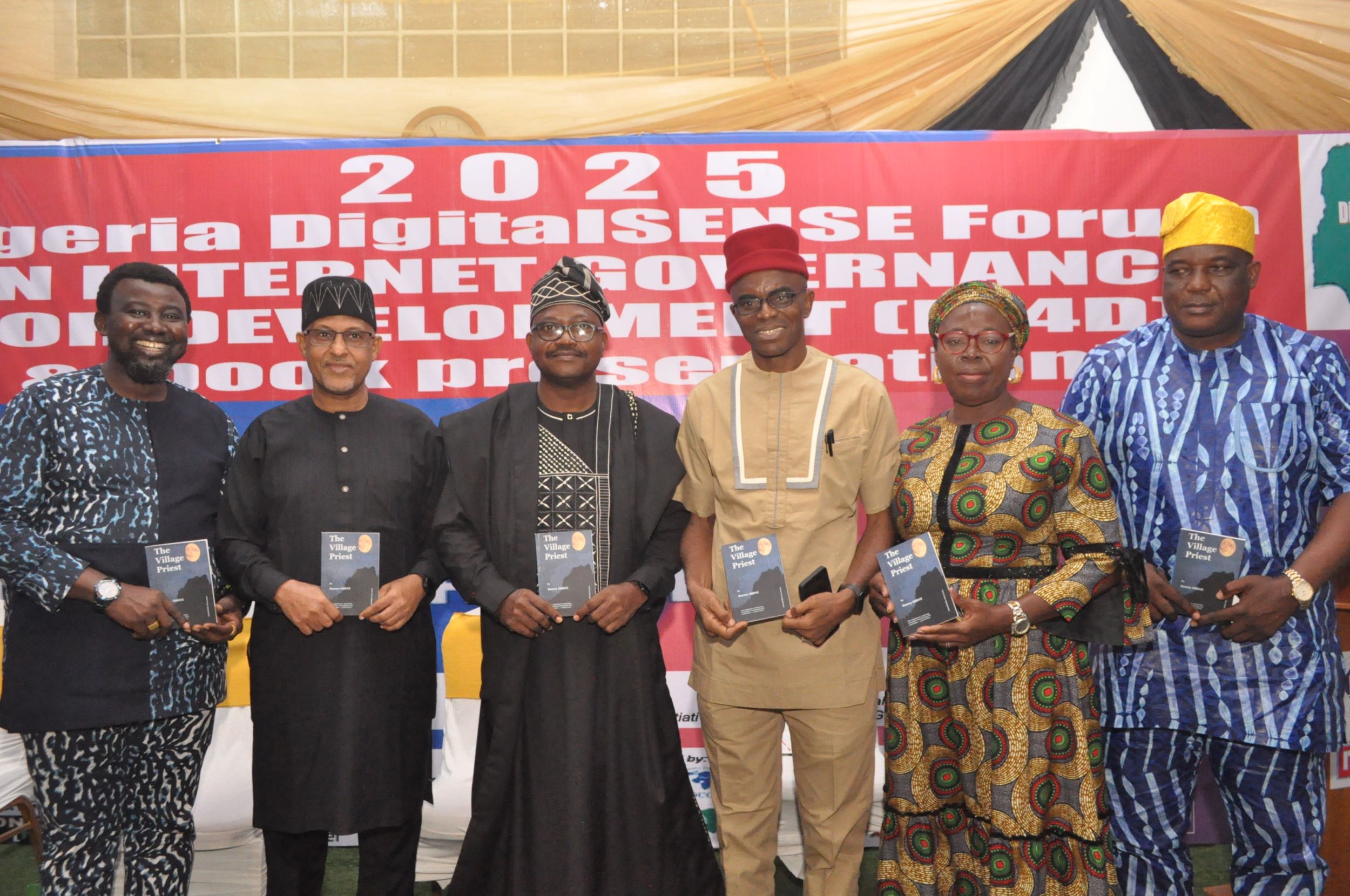Telecom
AfriTECH2021 Seeks Urgent Steps to Drive Inclusive Digital Economy

Stakeholders in the information and communication technology industry have stressed that accelerating innovation remains the best path to drive inclusive growth.

L-R: Mr. Chinenye Mba-Uzoukwu, president, Institute of Software Practitioners of Nigeria (ISPON); Engr. Oluwatoyin Asaju, director, Spectrum Administration at NCC and Dr. Ikechukwu Adinde, director, Public Affairs at NCC, during AfriTECH2021 in Lagos recently
The tech experts among who are C-Suite executives, founders, presidents of companies/organisations, presidents of industry associations, startups/entrepreneurs and government officials, and others., unanimously agreed on this at the 2021 Africa Tech Alliance Forum (AfriTECH2021) held in Lagos on Wednesday October 13, 2021, highlighting that building infrastructure to extend internet access in underserved areas will drive digital transformation across board.
Prof. Umar Garba Danbatta, executive vice chairman of the Nigerian Communications Commission (NCC), focusing his presentation on “NCC as a Digital Transformation Crusader and Nigeria’s in-Road to 5G Deployment,” stated that, following the advent of COVID-19 pandemic, there has been a change in the dynamics of people’s interaction, especially on the Internet.
The EVC represented by Engr. Oluwatoyin Asaju, director, Spectrum Administration at NCC, said that almost every means of communication has become virtual in one way or the other.
“Already, we are set for the auction of some spectrum slots in the 3.5GHz band. The other day I was at the National assembly, I informed the senate that we were 95 per cent ready for 5G. Today as we speak, I am delighted to tell you that we are already at 97 percent completion,” Danbatta said at #AfriTECH2021.
“The Committee set up to auction the Spectrum has already developed an Information Memorandum (IM) which is already published for inputs and comments from all industry stakeholders. Prior to this, a 5G deployment plan was developed and we have since secured Federal Government’s approval,” he said.
Mallam Kashifu Inuwa Abdullahi, director general, National Information Technology Development Agency, (NITDA), said that with advent of new technologies occasioned by the fourth industrial revolution, it has become imperative to increase Africa’s level of preparedness and develop capacity of the youth.
Abdullahi who was represented by Dr. Usman Gambo Abdullahi, director IT Infrastructure Solutions at NITDA, spoke on ‘Reskilling Africa’s Youth for Future Jobs from NITDA’s perspective’ adding that the fourth industrial revolution will continue to fundamentally alter the way human begins live, work, and relate to one another.
He said, “We need to look at the educational sector and focus more on skills and research that can be used to develop the economy. People should not see education as the end but means to the end. We need to look for ways to disabuse people’s mind on paper qualification and inculcate in them those skills required for the imminent industrial revolution and also focus more on science and technology.”
In her keynote address anchored on the Forum’s theme: Embracing Change and Digital Transformation in the New Normal, Olatomiwa Williams, the Country Manager, Microsoft Nigeria, said that COVID-19 has happened with different experiences, but there are a lot of opportunities for the Continent.
She said leveraging technology to ensure that the continent is actually accelerating the digital economy potentials cannot be over-emphasised
“Looking at the impact of COVID-19 and how it has accelerated digital transformation and based on research and engagements globally, two years of digital transformation was achieved within two months. What does that tell us? It tells us that because we were able to embrace the change that COVID brought, we were able to make those changes happen. These changes continue to accelerate. So, it means that an organization can no longer do business as usual. Everyone needs to embrace digital transformation at a fast reach”, the Microsoft Country Manager said.
Zoho Corporation also hosted a workshop during AfriTECH2021. Andrew Bourne, Regional Manager at Zoho Africa, said that for organizations large and small, the year 2020 was the longest year ever however the quick lesson is the urgent need to reorient the workforce to a new way of working.
“It came swiftly with playbooks being written and rewritten depending on what leaders were learning from government authorities, medical professionals, and from their own employees.
With a reference to Forbes’ report, he said: “Millennial currently hold the largest purchasing power, but Gen-Z is close behind. The group, which was born between 1996 and 2010, already holds $44 billion buying power ($600 billion when considering their influence on their parents’ spending) and will hit the workforce and become powerful consumers in the next few years. In the next year, they will account for 40% of all U.S consumers. To succeed, companies need to know how to tailor a great consumer experience for Gen-Z”.
Andrew also demonstrated how to drive customer loyalty through a CRM system. Through this means new customers get introduced to the company through a ‘promoting’ customer which could be triggered by word of mouth, social media recommendations or customer testimonial.
In his part, Prof. Muhammed Abukakar, managing director and ceo, Galaxy Backbone Limited, has expressed the company’s preparedness to provide ICT infrastructure and services to public institutions and the underserved communities in Nigeria.
Abukakar was speaking on ‘Boosting Cloud Infrastructure for Digital Economy through Partnerships’ through a representative, Mr. Timi Fadeyi, head DataCentre at Galaxy Backbone, said “We need to work smarter, faster and simpler – a combination of a hybrid mode of working and harnessing relationships; virtual, physical, both.
“Artificial Intelligence is reshaping value chains, industries, communities, countries and the works entirely. You also need to secure your data; secure your entire digital experience, a combination of technology and you.
Other key industry stakeholders participated at the one-day Forum, which also featured exhibition by some sector players such as Zoho Corporation, Medallion Communications, Layer3 and Notion Technology Limited (representatives of American #1 Technology company – Comway – and Hsv Products)
The AfriTECH2021 had Zoho as the lead sponsors received supports from the Nigerian Communications Commission (NCC); the National Information Technology Development Agency (NITDA); Galaxy Backbone Limited, as partners, also sponsored by Rack Centre, Digital Encode, Cloudflex Computing Services Limited, Zinochrome International, Layer3, Notion Technology Limited and Medallion Communications.
Mr. Peter Oluka, Editor of TechEconomy.ng and the convener of AfriTECH said that Africa must play leading role in the fourth industrial revolution by embracing emerging technologies such as 5G, Internet of Things; Cloud Computing; Quantum Computing Augmented/Virtual Reality which are also playing a critical role in improving remote communication over the internet with great user experience.
He said that the recent events around COVID-19 Pandemic demonstrated why the government and the private sector must embrace digital transformation.
Telecom
Lebara, New Operator Enters Nigerian Telecom Arena, Sells Minutes, Not Airtime

Lebara Nigeria has officially stepped into Nigeria’s bustling telecom market with the introduction of its unique 0724 number series—a bold move that promises fresh competition and a more transparent user experience.

Leveraging its status as a Tier 5 Mobile Virtual Network Operator (MVNO), the company is positioning itself not just as another telecom player but as a catalyst for change, offering innovative packages built on fairness and clarity.
From day one, Lebara Nigeria has been ready to compete with industry giants like MTN, Airtel, Globacom, and 9mobile, having secured full interconnectivity with all of them.
This critical footprint ensures that its voice and data services are accessible and of high quality nationwide.
Akin Adesokan, Lebara’s chief operating officer, highlighted the company’s strategic intent: “Our readiness with the 0724 series and full interconnect setup underscores our unwavering commitment to seamless integration, customer freedom, and market inclusivity.” Indeed, the company has taken considerable steps to ensure regulatory compliance and operational strength, leveraging its global expertise as an MVNO and its freshly minted licence under the NCC’s highest tier.
What truly differentiates Lebara’s offering is its unconventional pricing model. Eschewing traditional prepaid airtime, it sells voice bundles and data packages that align with real usage, not ambiguous credit deductions. “You buy minutes, not airtime. If your call ends in 30 seconds, you still have 99 minutes and 30 seconds left. That’s the kind of clarity and control we are bringing to Nigerian telecoms,” explained Samuel Alabi, head of Corporate Communications.
This clarity responds to a long-standing frustration among Nigerians, where ₦100 airtime often disappears quickly and opaquely. Lebara’s minutes-based system offers predictability and transparency—a refreshing contrast in a market hungry for accountability.
Lebara’s entrance is more than a marketing exercise; it’s a strategic diversification of Nigeria’s mobile ecosystem.
With over 220 million active mobile lines, Nigeria is Africa’s biggest telecom consumer.
The NCC’s move to licence 41 MVNOs, including Lebara, illustrates a policy shift aimed at introducing more competition and improving service quality. Technically agile and digitally native, Lebara leverages existing network infrastructure, augmented by automated systems—a lean operation compared to the capital-intensive MNO model.
he status quo. With strategic execution and continued regulatory support, this could mark the beginning of a new chapter: one where Nigerians no longer need to ask, “Can you hear me now?” but instead say, “Yes—and I know exactly what it cost.”
Telecom
PIN Pushes for Equitable Digital Governance at World Internet Forum

As the 20th Global Internet Governance Forum (IGF) opens in Lillestrøm, Norway, leading pan-African social enterprise Paradigm Initiative (PIN) is championing grassroots voices in global digital policy discussions.

Running from June 23–27 under the theme “Building Digital Governance Together,” the IGF unites stakeholders from civil society, governments, the private sector, and technical communities to tackle pressing digital issues such as access, AI ethics, surveillance, and content moderation.
The discussions also contribute to the upcoming World Summit on the Information Society (WSIS)+20 review in December 2025.
PIN’s participation comes at a time when digital governance decisions are increasingly shaping the future of billions. “It is essential that grassroots solutions are heard,” said ‘Gbenga Sesan, Executive Director of PIN. “At PIN, we believe that meaningful digital inclusion requires more than just connectivity.
“It demands inclusive, progressive and sustainable policies and frameworks built taking the realities of grassroots stakeholders into consideration.”
Representing PIN at IGF 2025 are Sesan, Chief Operating Officer Nnenna Paul-Ugochukwu, and Senior Manager for Partnerships and Engagements Thobekile Matimbe. They will engage in strategic sessions on topics like connectivity in excluded communities, AI accountability in content moderation, and human rights in emerging tech.
The team will also participate in coordination meetings with partners including Meta, UNESCO, the Freedom Online Coalition, and GPD.
PIN’s presence at the forum underscores its ongoing mission to embed digital rights within grassroots realities and to ensure that global internet governance frameworks are inclusive, accountable, and responsive to the needs of marginalised communities.
Telecom
Remmy Nweke’s “The Village Priest” Garners High Praise from Tech Community

Information and Communications Technologies (ICT) stakeholders have applauded the latest in bookshelf by Remmy Nweke, the Village Priest, which was presented at the recently concluded Nigeria DigitalSENSE Africa Forum on Internet Governance for Development (IG4D) in Lagos.

The presentation and review of the book, “The Village Priest” by Ogbuefi Remmy Nweke, largely described as a powerful narrative explored the intersection of tradition and innovation in rural Igboland, received widespread acclaim, with its themes resonating deeply with the event’s focus on ‘Global Digital Compact: Opportunities for Multi-stakeholders in Nigeria.’
The highly anticipated review was delivered by Mr. ‘Gbenga Sesan, Executive Director of Paradigm Initiative (PIN), a renowned social entrepreneur and advocate for digital rights and inclusion in Africa.
Sesan lauded Nweke’s prose fiction for its insightful portrayal of “innovative technology adaptation transforming rural communities,” describing it as “a careful work of cultural documentation, offering not just a story but a chronicle—a record of transition that many rural and even urban African communities continue to live through.”
Sesan’s review highlighted the book’s central character, Ogboo AniEze, the revered chief priest of Ilimefo, whose life is dedicated to preserving his village’s customs. The narrative unfolds as “the village and its people, their traditional practices and strong cultural heritage at the crossroads!” with the arrival of GSM technology—a “strange and mysterious piece of technology” that initially challenges Ogboo AniEze’s traditional views.
The review detailed the chief priest’s journey of reconciliation, from initial fear of GSM eroding cultural heritage to a profound understanding that the technology “also offered opportunities for growth, development, and connection with the wider world.” This transformation leads to a new era of harmony in Ilimefo, where “tradition and modernity coexisted in balance.” The book beautifully illustrates how mobile phones become “a powerful tool for preserving the village’s cultural heritage” and how interfaith collaboration, particularly with Catholic priest Fada Ekie, fosters a “fusion of traditions” and a “new spiritual identity.”
“It teaches us, without preaching,” Sesan concluded, “that true innovation is not in abandoning our roots, but in strengthening them with new tools.”
This year’s Nigeria DigitalSENSE Forum, was presided over by Dr. Jimson Olufuye, former President of the Information Technology (Industry) Association of Nigeria and a member of the UN Secretary-General’s IGF Multistakeholder Advisory Group (MAG), served as a crucial platform for discussing the future of digital governance.
Olufuye also commended the author, Nweke for his perseverance in serving the ICT industry as well as endearing documentation of the sector.
For the Managing Director, Internet Exchange Point of Nigeria, Mr. Muhammed Rudman, the latest book by Nweke depicts the gift of in depth creativity and urged him on, despite the challenges the sectorial environment throws at industry players.
Organized by ITREALMS Media and hosted under DigitalSENSE Africa (DSA), an At-Large Structure certified by ICANN, the forum brought together key partners including the Nigerian Communications Commission (NCC), Internet Exchange Point of Nigeria, Internet Society Nigeria chapter, Association of Licensed Telecoms Operators of Nigeria (ALTON), and ICANN.
The NDSF series, running since 2009, continues to “motivate public discourse and create awareness on the technological cum business benefits of rapidly advancing technologies capable of impacting on Internet Governance, Internet Protocol (IP) addresses and domain name industry, access and affordability,” while offering a vital platform for industry networking.
The event not only celebrated the literary achievement of Ogbuefi Remmy Nweke, a multiple award-winning journalist, but also reinforced the commitment of ICT stakeholders to fostering digital inclusion and innovation across Nigeria.

 Telecom2 days ago
Telecom2 days agoMTN Says New N6.98 USSD Charge Won’t Affect Airtime Recharge

 Telecom2 days ago
Telecom2 days agoNnaemeka Ani Calls on African Techies to Rewrite the Narrative

 General News2 days ago
General News2 days agoStudy Reveals 7% of Industrial Organizations Tackle Vulnerabilities Only When Necessary

 E-Financial2 days ago
E-Financial2 days agoSofri Rejigs Digital Platforms for Better Customer Experience

 General News2 days ago
General News2 days agoNITDA, NCFRMI Forge Strategic Alliance for Inclusive Digital Transformation of Displaced Nigerians

 E-Business14 hours ago
E-Business14 hours agoOver 7m Streaming Accounts’ Credentials were Leaked in 2024 – Report

 E-Financial14 hours ago
E-Financial14 hours agoS&P Global Ratings Downgrades Ecobank Nigeria’s Credit Rating to CCC-, Outlook Negative

 Telecom2 days ago
Telecom2 days agoCrypto Scam Unmasked: U.S. Recovers Record $225m in Global Fraud Bust
























